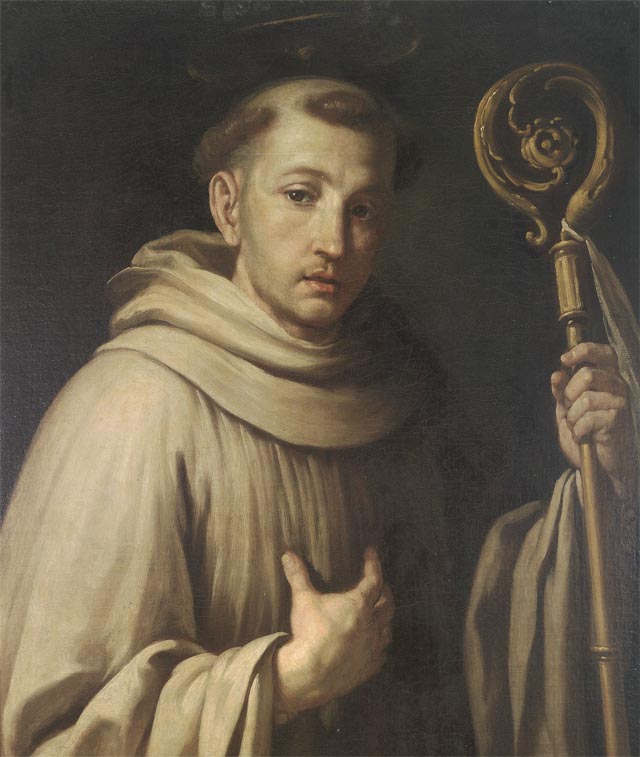
Are you familiar with the Trappist Cistercians --those silent, austere farming monks who have an abbey at Piffard in the Diocese of Rochester? Well, these men mirror the life and values of their “second founder,” St. Bernard of Clairvaux. Bernard was born into a noble French family in 1090 AD. As he grew up, he was admired for his good looks, sharp wits and warm disposition. But those who liked him for these surface qualities did not see his underlying desire to serve God alone.
Attracted to the Cistercian monks at Citeaux, he not only entered this strict monastery in 1112, but brought 31 relatives and friends with him into the religious life. How is that for leadership! Just three years later, his superiors were so pleased with him as a monk that they sent him off, though only 25, to found a new monastery. The locale was called “Wormwood Valley.” He changed the name to “Clairvaux,” “Valley of Light.” The new monastery quickly rose in population from 12 to 130. During his own lifetime, Bernard witnessed the foundation of 767 more Trappist-Cistercian monasteries in many countries.
If he had had his “druthers,” St. Bernard would have spent his whole life within the walls of the cloister. But this was not to be. Most saints are not geniuses; Bernard was. He quickly became recognized as an expert on spiritual life, as a preacher without equal, and as a theological writer; eventually proclaimed a doctor of the Church.
He was recognized even more widely in his lifetime as a natural leader, called on to help Christendom wherever help was needed. Once, two men claimed to be pope. Bernard was brought in to defend the valid claimant. Abelard the philosopher was teaching errors, and the Albigensian sect, heresy. Bernard was brought in to refute both of them. The Holy Land, rescued in the First Crusade from the Muslims, was reconquered by them. Bernard was brought in to preach the Second Crusade (and unfairly blamed when the Crusade fizzled). Even in 1153, when Bernard was in his last illness, the Archbishop of Trier pleaded with him to leave the monastery and make peace between the citizens of Metz and the Duke of Lorraine. Again, the saint succeeded, but he died on August 20 of the same year.
Bernard of Clairvaux was thus both a mystic and a leader. “St. Bernard’s Glove” is a good symbol of both talents. The glove is a relic that has come down from him. On each finger is embroidered a little French motto of Christian behavior. “Merci” (“Say thanks!”). “Volontiers (“Be generous!”). Qu’ importe?” (“Ignore trifles!”). “Tais-toi” (“Don’t Say it!”) and “Confie-toi” (“Be of good heart!”). Try that on for size! --Father Robert F. McNamara
When we commemorate the saints we are inflamed with another yearning: that Christ our life may also appear to us as he appeared to them and that we may one day share in his glory. Until then we see him, not as he is, but as he became for our sake. He is our head, crowned, not with glory, but with the thorns of our sins. As members of that head, crowned with thorns, we should be ashamed to live in luxury; his purple robes are a mockery rather than an honor. When Christ comes again, his death shall no longer be proclaimed, and we shall know that we also have died, and that our life is hidden with him. The glorious head of the Church will appear and his glorified members will shine in splendor with him, when he forms this lowly body anew into such glory as belongs to himself, its head.
Therefore, we should aim at attaining this glory with a wholehearted and prudent desire. That we may rightly hope and strive for such blessedness, we must above all seek the prayers of the saints. Thus, what is beyond our own powers to obtain will be granted through their intercession. (Sermons)
Merciful redeemer,
who, by the life and preaching of your servant Bernard,
rekindled the radiant light of your Church:
grant us, in our generation,
to be inflamed with the same spirit of discipline and love,
and ever to walk before you as children of light;
through Jesus Christ your Son our Lord,
who lives and reigns with you,
in the unity of the Holy Spirit,
one God, now and for ever. Amen. (English Missal)